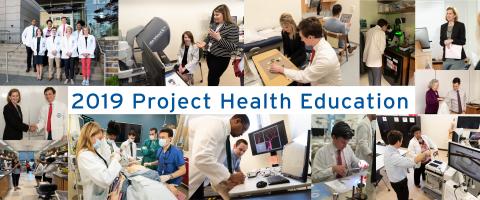
04/24/2019
Duke University School of Medicine and Duke University Health System partnered for their 9th Project Health Education event (formally Project Medical Education) from April 17-19, where seven congressional staff from the North Carolina delegation and House and Senate committees learned about the missions of medical schools and teaching hospitals. New this year, the program also included a half day at the University of North Carolina at Chapel Hill School of Medicine and Adams School of Dentistry.
After a welcome dinner on the opening night with Duke Health leadership, the program kicked off with participants being “admitted” to medical school, learning about the curriculum, and participating in their white coat ceremony with Dean Mary Klotman; Colleen Grochowski, Associate Dean for Curricular Affairs; and Dr. Caroline Haynes, Associate Dean for Medical Education. The students then moved to “begin their education” in the Surgical Education and Activities Lab and Human Simulation and Patient Safety Center. Here the students participated in hands on experiential learning sessions, practiced their skills intubating mannequins in an "emergency" simulation, were put through admissions interviews, and trained with the state-of-the-art surgical education technology at Duke University School of Medicine.
After receiving their hands on training, the participants moved onto Graduate Medical Education (GME), where they heard from Dr. Catherine Kuhn, Associate Dean for Graduate Medical Education, and Dr. David Turner, Associate Director of Graduate Medical Education. Drs. Kuhn and Turner spoke about the different roles in GME, financing the programs at Duke, and the matching experience. The participants continued in the role playing experience by receiving their final bill for medical school, matching (or not) to their residency, and receiving their on call pagers.
During the lunch and learn session, Dr. Devdutta Sangvai, Executive Director for Duke Connected Care, spoke to the group about the impact that academic medical centers have on the community and how these collaborations benefit population health. He also introduced the participants to Duke Connected Care, the physician-led accountable care organization formed by Duke Health. Stuart Smith, Associate Vice President for Finance, closed out the lunch by discussing the financial operations of an academic medical center.
The participants then spent the afternoon at UNC Chapel Hill School of Medicine and School of Dentistry, where they became dental students, participated in simulation activities, learned about CAR-T therapy, toured UNC Children’s Hospital and had dinner with leadership.
On the final day of the program, participants had an early rise to participate in clinical rounds with physicians, nurses, and other health care providers at Duke University Hospital. The group split between different intensive care departments and had the opportunity to see firsthand the role of academic medical centers in treating the patients and the community.
The final segment of the program was focused on the role of medical research and its funding at an academic medical center. The participants had a hands on experience in the Dave Lab, where they saw the impact of NIH research funding in treating cancer from bench to bedside. They then heard from Dr. Fumiko Chino, Radiation Oncologist, about the financial toxicity and cost of cancer care from the patient prospective. Udobi Campbell, Associate Chief Pharmacy Officer for Ambulatory Services at Duke University Hospital also spoke about drug pricing and how Duke works to promote patient access with the rising drug costs.
Duke Health Government Relations holds these programs, and others, to offer new and experienced congressional staff an on campus experience to see the missions of education, research, clinical care and community health in person, in hopes it will inform their work and strengthen policy.
